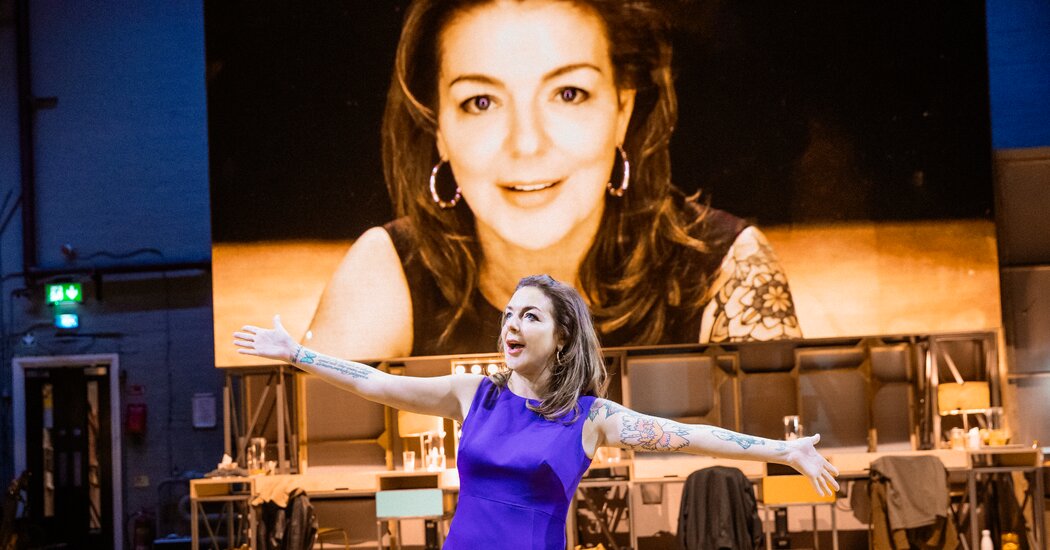In a London auditorium, a work of art is being desecrated. “Opening Night,” John Cassavetes’s understatedly stylish 1977 movie about an actress struggling with midlife ennui, has been reimagined as a musical by the Belgian director Ivo van Hove, and the result is a travesty.
Its antiheroine, the Broadway superstar Myrtle Gordon (Sheridan Smith), has landed the lead role in a play about a middle-aged woman. But she isn’t feeling it: Though she is about 40, she insists she can’t relate. She stumbles through rehearsals, clashing with the director, Manny (Hadley Fraser), and the playwright, Sarah (Nicola Hughes), then goes rogue during previews, taking liberties with the script.
To compound matters, the actress develops a neurotic fixation on Nancy (Shira Haas), a 17-year-old fan killed in a car crash moments after getting Myrtle’s autograph. Convinced that Nancy is a cipher for her own lost youth, Myrtle intermittently hallucinates the dead girl’s ghost, and even converses with it. Myrtle is unraveling, but the show — somehow — must go on.
It’s a compelling story line, filled with dramatic possibilities, but “Opening Night,” which runs at the Gielgud Theater through July 27, is scuppered by a series of poor choices. Smith is miscast as Myrtle, for a start: Her onstage bearing exudes a homely approachability rather than high-strung poise or inscrutable aloofness.
Benjamin Walker is wooden as Maurice, Myrtle’s stage co-star and ex-partner, who Cassavetes himself played charmingly in the film. The estranged couple’s brittle onstage chemistry is an essential ingredient in the drama; here, they seem like actual strangers. Haas’s spectral Nancy is a disconcertingly cutesy symbol of youthful feminine vitality, a sprite-like figure who scurries around the stage in a short skirt, knee-high socks and platform boots — suggesting not so much a young woman as a pubescent child.
The songs, by Rufus Wainwright, are algorithmically bland. Several address aging, including the unsubtly titled “A Change of Life” (about menopause) and “Makes One Wonder,” a duet in which Myrtle and Sarah realize that, as women of a certain age, they may have more in common than they’d like to admit.
Others are about showbiz: “Magic” is an upbeat cabaret-style number about the wonder of the stage; “Moths to a Flame” is a somber, sentimental paean to the indefatigability of thespians everywhere. There is a brief foray into rock opera during an excruciating scene in which Myrtle, having figured out she must banish Nancy’s specter to get herself back on track, scuffles with the girl-child amid flashing strobe lights and 1980s-style power riffs. It’s so schlocky that it almost feels like a sendup.
Jan Versweyveld’s set is a theater within a theater. The rehearsal space occupies the foreground, and a row of vanity mirrors at the rear of the stage represents the backstage area. As in van Hove’s 2019 adaptation of “All About Eve” — another story about the emotional travails of an aging actress — camera operators stalk its perimeter, transmitting close-up, real-time footage of the actors onto a big screen above the stage.
The idea is to ramp up the psychodrama by bringing us up close and personal, but there isn’t much intensity to intensify. The multiple angles add little to the experience. (The occasional bird’s-eye view is particularly unnecessary, unless you happen to have an interest in the topography of hairlines.) A screen caption at the start of the show informs us that a documentary film crew is recording the company’s rehearsals — a plot device that is supposed to make this camerawork feel less like a gratuitous gimmick, but so flimsily transparent that it has the opposite effect.
There are one or two good moments, including a tense rehearsal scene in which Myrtle objects to having to endure an onstage slap. She says it’s humiliating, but Manny insists it’s artistically necessary. Smith renders the standoff with a bleak comic pathos: At one point she even slaps herself to forestall the blow. (For van Hove, who is known for pushing his performers to the limit, this material is close to home.) Near the end, as the characters make their final preparations for opening night, the big screen cuts to recorded footage of theatergoers passing through the Gielgud foyer a couple of hours earlier — a clever touch that spurred a ripple of amused murmurs from the audience. But these are slim pickings.
As an artist yearning to take back control of her narrative, Myrtle should resonate at a time when questions of agency — for women and minorities, among others — are on many people’s minds. But van Hove’s corny treatment trivializes her suffering. Cassavetes’s movie had an elliptical quality that drew viewers in through the strength of its narrative artifice and the power of the actors’ performances; here, the story never comes to life, and the themes are labored. Van Hove has transformed a taut, subtly observed character study into a sludgy melodrama.
Opening Night
Through July 27 at the Gielgud Theater in London; openingnightmusical.com.

